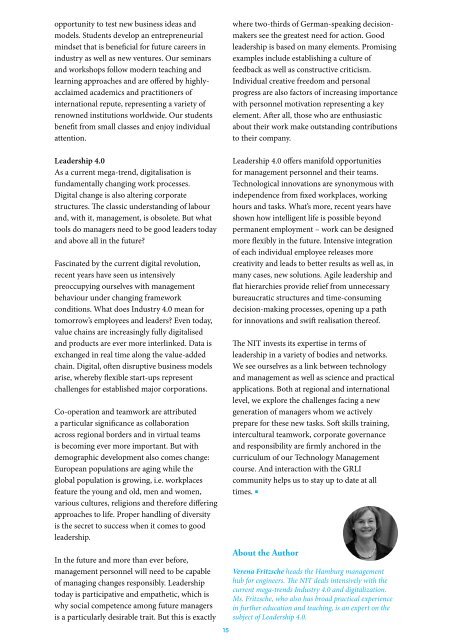Relations
GRLI_magazine_14_final_screen
GRLI_magazine_14_final_screen
You also want an ePaper? Increase the reach of your titles
YUMPU automatically turns print PDFs into web optimized ePapers that Google loves.
opportunity to test new business ideas and<br />
models. Students develop an entrepreneurial<br />
mindset that is beneficial for future careers in<br />
industry as well as new ventures. Our seminars<br />
and workshops follow modern teaching and<br />
learning approaches and are offered by highlyacclaimed<br />
academics and practitioners of<br />
international repute, representing a variety of<br />
renowned institutions worldwide. Our students<br />
benefit from small classes and enjoy individual<br />
attention.<br />
where two-thirds of German-speaking decisionmakers<br />
see the greatest need for action. Good<br />
leadership is based on many elements. Promising<br />
examples include establishing a culture of<br />
feedback as well as constructive criticism.<br />
Individual creative freedom and personal<br />
progress are also factors of increasing importance<br />
with personnel motivation representing a key<br />
element. After all, those who are enthusiastic<br />
about their work make outstanding contributions<br />
to their company.<br />
Leadership 4.0<br />
As a current mega-trend, digitalisation is<br />
fundamentally changing work processes.<br />
Digital change is also altering corporate<br />
structures. The classic understanding of labour<br />
and, with it, management, is obsolete. But what<br />
tools do managers need to be good leaders today<br />
and above all in the future?<br />
Fascinated by the current digital revolution,<br />
recent years have seen us intensively<br />
preoccupying ourselves with management<br />
behaviour under changing framework<br />
conditions. What does Industry 4.0 mean for<br />
tomorrow’s employees and leaders? Even today,<br />
value chains are increasingly fully digitalised<br />
and products are ever more interlinked. Data is<br />
exchanged in real time along the value-added<br />
chain. Digital, often disruptive business models<br />
arise, whereby flexible start-ups represent<br />
challenges for established major corporations.<br />
Co-operation and teamwork are attributed<br />
a particular significance as collaboration<br />
across regional borders and in virtual teams<br />
is becoming ever more important. But with<br />
demographic development also comes change:<br />
European populations are aging while the<br />
global population is growing, i.e. workplaces<br />
feature the young and old, men and women,<br />
various cultures, religions and therefore differing<br />
approaches to life. Proper handling of diversity<br />
is the secret to success when it comes to good<br />
leadership.<br />
In the future and more than ever before,<br />
management personnel will need to be capable<br />
of managing changes responsibly. Leadership<br />
today is participative and empathetic, which is<br />
why social competence among future managers<br />
is a particularly desirable trait. But this is exactly<br />
15<br />
Leadership 4.0 offers manifold opportunities<br />
for management personnel and their teams.<br />
Technological innovations are synonymous with<br />
independence from fixed workplaces, working<br />
hours and tasks. What’s more, recent years have<br />
shown how intelligent life is possible beyond<br />
permanent employment – work can be designed<br />
more flexibly in the future. Intensive integration<br />
of each individual employee releases more<br />
creativity and leads to better results as well as, in<br />
many cases, new solutions. Agile leadership and<br />
flat hierarchies provide relief from unnecessary<br />
bureaucratic structures and time-consuming<br />
decision-making processes, opening up a path<br />
for innovations and swift realisation thereof.<br />
The NIT invests its expertise in terms of<br />
leadership in a variety of bodies and networks.<br />
We see ourselves as a link between technology<br />
and management as well as science and practical<br />
applications. Both at regional and international<br />
level, we explore the challenges facing a new<br />
generation of managers whom we actively<br />
prepare for these new tasks. Soft skills training,<br />
intercultural teamwork, corporate governance<br />
and responsibility are firmly anchored in the<br />
curriculum of our Technology Management<br />
course. And interaction with the GRLI<br />
community helps us to stay up to date at all<br />
times. ■<br />
About the Author<br />
Verena Fritzsche heads the Hamburg management<br />
hub for engineers. The NIT deals intensively with the<br />
current mega-trends Industry 4.0 and digitalization.<br />
Ms. Fritzsche, who also has broad practical experience<br />
in further education and teaching, is an expert on the<br />
subject of Leadership 4.0.


